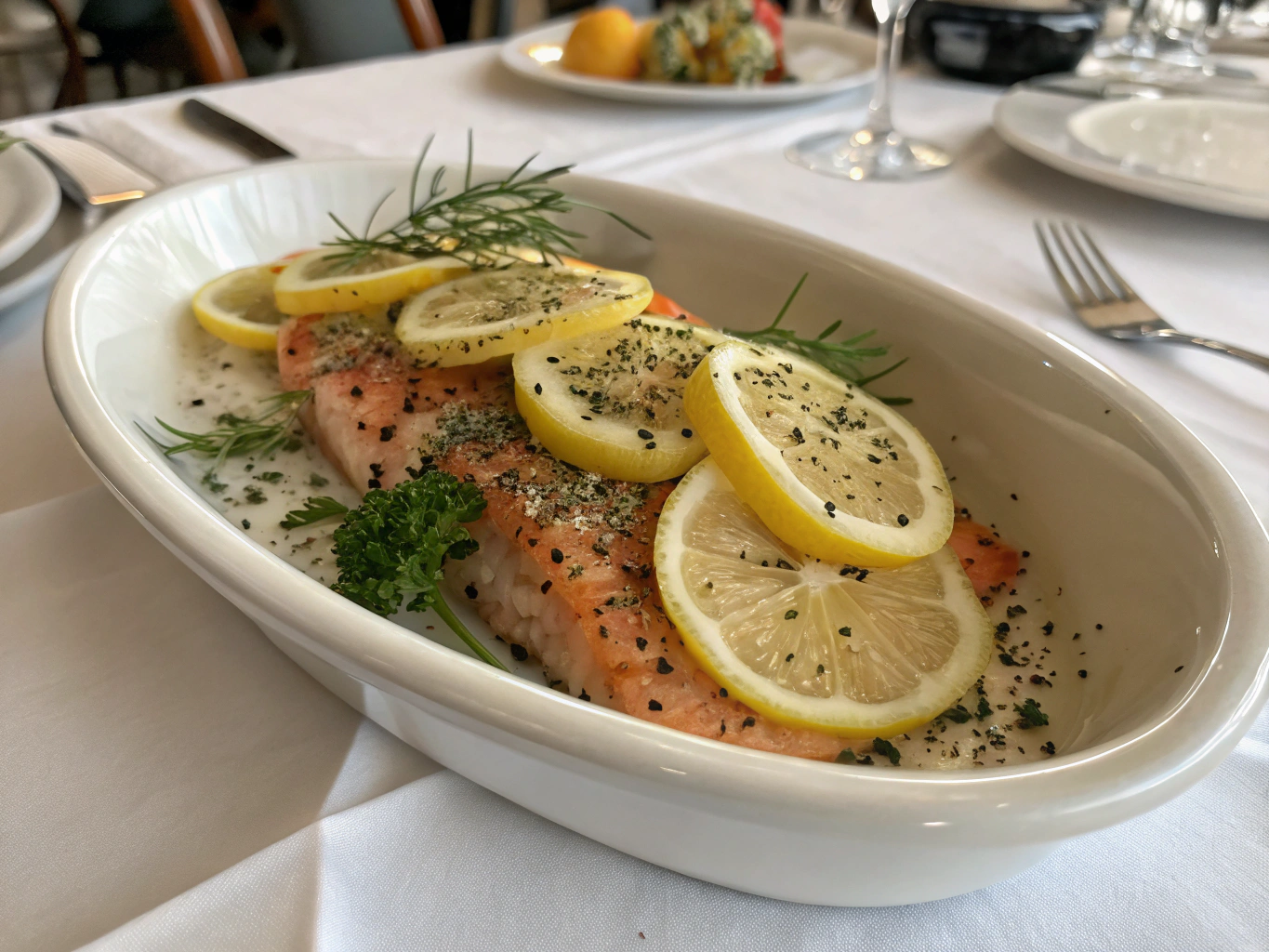
There’s something about the scent of lemon zest tingling in the air, dancing with the warmth of cracked pepper, that whisks me right back to my grandmother’s Charleston kitchen. I’m MacMar, and back then, the culinary lessons had no textbooks—just taste, timing, and trusting your nose. With her by my side, I first learned the joy of blending simple ingredients to create comforting, flavor-packed magic. This lemon pepper chicken is a prime example—crispy, citrus-kissed skin locking in impossibly juicy meat. Whether I was serving this at a community potluck or after a long day manning the grill at a food truck, folks always circled back asking, “What’s that zingy seasoning?” That’s the beauty of lemon pepper—it brings bold, bright heat with very little effort. In this article, we’ll dive into the story behind this blend, walk through a delicious recipe, and look at how you can make it your own, using ingredients you likely already have at home.
Lemon Pepper Flavor: Zesty Roots and Southern Soul
A Flavor Born in Simplicity
Lemon pepper didn’t always have its own aisle of recognition, but it’s earned a rightful place on countless spice racks for good reason. It typically combines dried lemon zest, cracked black pepper, and salt. Some varieties include garlic, onion powder, or sugar to round out the tart and warm layers. I remember watching my grandma scrape lemon peels over a grater with the patience of a saint before mixing it with coarse pepper and sea salt. Nothing prepackaged—just the real thing. Over time, lemon pepper rose above its humble origins to become a go-to for quick weeknight chicken, salmon glazes, and even seasoned popcorn.
This fusion of tang and bite turns even the simplest protein into a crowd-pleaser. That’s why it’s become a favorite seasoning across both traditional Southern kitchens and modern health-conscious homes. You’ll find variations popping up on everything from baked tofu to roasted vegetables. What keeps lemon pepper relevant is its undeniable ability to uplift a dish—making it brighter without overpowering.
Why Lemon Pepper Stands Out
What sets lemon pepper apart from just plain lemon or black pepper is its perfectly balanced contrast. You aren’t just getting citrus or heat—you’re getting both, harmonized. That balance makes it extremely versatile. Grilled lemon pepper chicken thighs served over a fresh arugula salad can taste wildly different from lemon pepper shrimp on creamy grits, yet both dishes feel complete.
As I’ve grown into my own cooking voice, that balance reminds me to blend creativity with comfort. I once folded a heavier lemon pepper seasoning into creamy vegan cauliflower alfredo as a base layer—it gave life to every bite without the need for extra salt or butter. You can understand now why this spice blend isn’t just about flavor—it’s about inspiration. Whether you’re making a comforting chicken bowl or improvising with pantry staples, lemon pepper spells delicious possibility.
Bold Lemon Pepper Chicken: Flavor That Speaks for Itself
Ingredients You’ll Need
To make this crusted lemon pepper chicken, all you need are familiar favorites from your kitchen. Feel free to swap a few out based on dietary preferences or availability.
- 4 bone-in, skin-on chicken thighs (or breasts)
- 2 tablespoons lemon pepper seasoning (or homemade: zest from 2 lemons + 2 tsp black pepper + 1 tsp salt)
- 1 tablespoon olive oil
- 1 teaspoon garlic powder
- 1 tablespoon lemon juice (freshly squeezed)
- Optional: ½ tsp smoked paprika or crushed red pepper for a spicy twist
For a homemade blend, omit store-bought lemon pepper and replace with 2 teaspoons of cracked pepper, 1 ½ teaspoon salt, zest from two fresh lemons, and a dash of granulated garlic. You can also check out how I adapted the blend in this spicy air fryer tofu strips recipe.
Timing Breakdown
This recipe is a weeknight hero—quick to prep, easy to cook, and perfect every time. Below are the timing details at a glance:
| Task | Time Required |
|---|---|
| Preparation | 10 minutes |
| Cooking | 25–30 minutes |
| Total Time | 40 minutes |
Easy Step-by-Step Instructions
Pat your chicken pieces dry with a paper towel—crispy skin starts here. Toss them in a large bowl with olive oil, then rub in the lemon pepper, garlic powder, and paprika. Make sure every nook is covered, especially under the skin.
Let it sit for about ten minutes while your oven preheats to 400°F. For extra flavor, marinate in the fridge up to 4 hours.
Place the chicken on a parchment-lined baking sheet or in a cast-iron pan, skin side up. Roast for 25–30 minutes until the skin blisters golden brown and a thermometer reads 165°F in the thickest part.
Brush with lemon juice right after taking it out of the oven. Let rest five minutes to keep all the juices intact. Serve hot with mashed sweet potatoes, garlicky roasted cabbage wedges or a fresh grain bowl.
Lemon Pepper Gets Versatile: Ways to Expand the Flavor
Beyond Chicken: Lemon Pepper for Everything
Once you’ve mastered chicken, this seasoning opens the door to new dishes. Its bold flavor blends beautifully with seafood—think seared salmon, grilled shrimp, or even baked cod. When I was testing different sauces for my creamy chickpea pot pie, lemon pepper added enough depth to carry flavor across rich, starchy layers.
It’s also a strong companion to vegetables. Try tossing cauliflower, brussels sprouts, or zucchini in olive oil and lemon pepper before roasting for a vegetable platter that has unmistakable zing.
Eggs love it too—whisk into scrambled eggs or sprinkle over a finished frittata. Don’t limit yourself, either. Stir a pinch into ranch dip, sour cream, or hummus for an awakening twist at your next snack night.
Health Aspects of Lemon Pepper
Is lemon pepper healthy? On its own, yes. Homemade or low-sodium versions are particularly friendly to clean eating habits. The lemon zest delivers vitamin C and natural flavor without needing extra fats or carbs. Store-bought blends, though, can be sneaky with sodium levels and preservatives—so always scan the label.
According to ChooseMyPlate.gov, using herbs, citrus zest, and peppers is a smart way to enhance food without added saturated fat or salt, aligning perfectly with heart-healthy diets.
From Scratch or Store-Bought: Making Lemon Pepper Work for You
DIY Lemon Pepper Seasoning
Making your own lemon pepper isn’t just satisfying—it lets you control every element. I start by zesting organic lemons onto parchment, letting it sit overnight at room temp until dry. Then I blend the zest with coarsely crushed black pepper and sea salt at a 2:2:1 ratio. Store in a sealed jar up to one month.
Want more dimension? Add a pinch of garlic powder or blend it with dried thyme like I do in my herb-loaded mashed cauliflower bake.
Best Substitutes for Lemon Pepper
Out of lemon pepper? Try mixing lemon zest with cracked pepper and just a touch of salt. If you don’t have fresh lemons, dried lemon peel or even bottled lemon juice with ground pepper can pinch-hit in a hurry.
Another solid option is to use lemon thyme and black pepper with a bit of grated parmesan—especially over seafood. Just remember that lemon pepper’s brightness is hard to fully duplicate, so prioritize freshness.
Frequently Asked Questions
What is lemon pepper made of?
It’s typically dried lemon zest, ground black pepper, and salt. Some versions include garlic, onion powder, or sugar.
What is a good substitute for lemon pepper?
Mix ground black pepper with fresh lemon zest and a touch of salt. Lemon juice with pepper or lemon thyme can also be used in a pinch.
Is lemon pepper healthy for you?
Yes—especially homemade. It adds flavor without fat, sugar, or calories. Just watch the sodium levels in store mixes.
Is lemon pepper different from lemon and pepper?
Yes—lemon pepper blends dried lemon zest with bold pepper and seasonings. It offers a unified, curated flavor, not just separate lemon and pepper notes.
Conclusion: Feel-Good Flavor in Every Bite
From childhood memories in Charleston to weeknight dinners today, lemon pepper remains one of my most loved ingredients. It’s bright, bold, and beautifully uncomplicated—perfect when I want to serve something with depth that doesn’t take hours. Whether roasted on chicken, shaken on veggies, or stirred into dips, this seasoning brings consistent flavor and inspiration.
And if tonight’s dinner leads to a little kitchen smoke and a lot of joy? All the better—I’ve been there too. Let lemon pepper turn your next meal into something worth remembering.
If you’re ready to explore more soul-warming eats, don’t miss the smoky textures in our spicy lentil walnut burgers, or the zesty tang wrapped up in this chickpea salad sandwich recipe.
